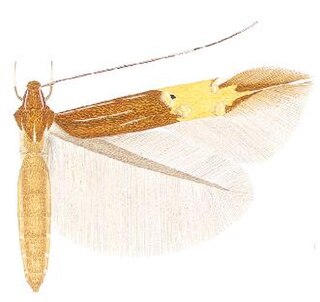Related Research Articles
Cosmopterix argentifera is a moth of the family Cosmopterigidae. It is known from Jamaica.
Cosmopterix astrapias is a moth of the family Cosmopterigidae. It is known from the United States, Argentina, Costa Rica, Jamaica, Mexico (Tabasco) and Puerto Rico.
Cosmopterix eukelade is a moth of the family Cosmopterigidae. It is known from Peru.
Cosmopterix gemmiferella is a moth of the family Cosmopterigidae. It is known from the United States and Canada (Ontario).
Cosmopterix gielisorum is a moth of the family Cosmopterigidae. It is known from Ecuador.
Cosmopterix hermippe is a moth of the family Cosmopterigidae. It is known from the Federal District of Brazil.
Cosmopterix iocaste is a moth of the family Cosmopterigidae. It is known from the Federal District of Brazil.
Cosmopterix similis is a moth of the family Cosmopterigidae. It is known from the US Virgin Islands and the British Virgin Islands (Guana).
Cosmopterix yvani is a moth of the family Cosmopterigidae. It is known from the Galapagos Islands.
Pebobs kale is a moth of the family Cosmopterigidae. It is known from Peru and Trinidad and Tobago.
Pebobs ipomoeae is a moth of the family Cosmopterigidae. It is known from Florida.

Pebobs tetragramma is a moth of the family Cosmopterigidae. It is known from Guyana.
Aristotelia pyrodercia is a moth of the family Gelechiidae. It was described by Walsingham in 1910. It is found in Mexico (Guerrero).

Thiotricha tenuis is a moth of the family Gelechiidae. It was described by Walsingham in 1891. It is found on the Seychelles, Mauritius, Réunion, South Africa and Gambia.
Cerconota melema is a moth in the family Depressariidae. It was described by Lord Walsingham in 1913. It is found in Panama.
Cerconota palliata is a moth in the family Depressariidae. It was described by Lord Walsingham in 1913. It is found in Guatemala.
Cerconota ebenocista is a moth in the family Depressariidae. It was described by Edward Meyrick in 1928. It is found in French Guiana.
Cerconota figularis is a moth in the family Depressariidae. It was described by Edward Meyrick in 1918. It is found in French Guiana and Colombia.
Cerconota tinctipennis is a moth in the family Depressariidae. It was described by Arthur Gardiner Butler in 1877. It is found in Amazonas, Brazil.
Cerconota dimorpha is a moth in the family Depressariidae. It was described by W. Donald Duckworth in 1962. It is found in Ecuador.
References
- ↑ Cerconota at Markku Savela's Lepidoptera and Some Other Life Forms.
- ↑ Cistula Entomologica 2 (17): 188
| This article on a moth of the subfamily Stenomatinae is a stub. You can help Wikipedia by expanding it. |